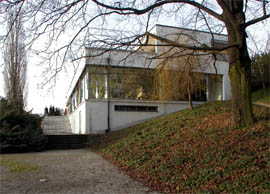
Brno will ask the ministries and the office how to handle the Tugendhat villa
 |
The Tugendhats, through their lawyer Augustin Kohoutek, requested the return of the villa based on the law on alleviating certain injustices caused by the Holocaust. However, the city believes that a transfer under this regulation is not possible - it is not a work of art, and moreover, the building is owned by the city, not the state. The idea of transferring it to the state and subsequent return seems unrealistic as well.
According to councilor Jiří Zlatuška, the council now wants to know the exact position of the ministry and the office regarding whether the Tugendhats would be entitled to obtain the villa under the law. "However, I still believe that the relevant law is not applicable in this case," Zlatuška told ČTK. He believes that any further progress in the negotiations about the future of the villa can be expected only at the next, March meeting of the city council.
The legal representative of the Tugendhats will have to send additional documentation regarding the request to the city. The city wants to know if the return of the villa is in the common interest of all descendants of the Tugendhats. The law mentions descendants, not just the children of the original owners. Kohoutek does not agree with this requirement. "In our opinion, it is not necessary for all of them to file the request. The word 'all' does not appear anywhere in the law, that is absolutely clear," Kohoutek told ČTK, adding that he would wait for the exact wording of the letter.
The Tugendhats want to initiate discussions with the city and ministry officials in the coming days. According to Kohoutek, they last met with city councilors at the January council meeting.
The Tugendhat villa has been listed since 2001 as the only Czech building of modern architecture on the UNESCO list. The building in the residential neighborhood of Černá Pole was designed in 1928 by the German architect Ludwig Mies van der Rohe. Experts note its unique spatial concept, choice of materials, and furnishings. However, in the last fifty years, it has suffered from careless use and unfortunate construction interventions, and therefore now requires a complete reconstruction. The city has been planning it for several years, but due to problems in the tendering processes, work has not yet begun.
The original owners, the couple Gretta and Fritz Tugendhat, came from families of prominent textile entrepreneurs. They lived in the house until 1938, when the family emigrated to Switzerland and then to Venezuela to escape the Nazis. After the Nazis occupied Czechoslovakia, the villa was confiscated by the Gestapo in 1940, and in 1945 it was seized by the then Czechoslovak state as property of the Nazis. The Tugendhat siblings still live abroad and have not filed for restitution within the legal time limits.
The heirs recently acquired the sculpture "Torso of a Walking Woman" based on the law on redressing certain injustices caused by the Holocaust, which originally adorned the villa and was later stored in the Moravian Gallery's depository. They then auctioned the sculpture by Wilhelm Lehmbruck at Sotheby's in London. An unknown collector purchased it for one million pounds, approximately 42 million crowns.
The sale of the sculpture has upset some Brno councilors and representatives. "Until that moment, I was willing to believe that the family simply reconsidered their clear position that they did not want the villa. Now I am definitely against the return," Zlatuška told ČTK, expressing his distrust of the Tugendhats. He described their approach as melodrama. When requesting the statue, they claimed they wanted to keep it at home as a family heirloom and that they had a deep emotional connection to it.
The English translation is powered by AI tool. Switch to Czech to view the original text source.
0 comments
add comment












